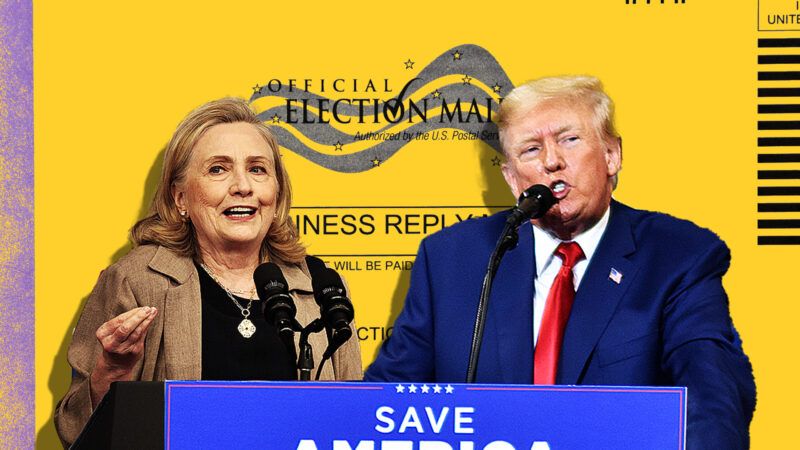'Election Fraud' Can Become Our Awful New Hyperbole
If we go through one election cycle after another and every loser unjustifiably cries fraud, eventually the claim will cease to impress.

Here's a scenario for election theft allegations that might pass for optimistic in a political environment as dysfunctional as our own: A few more years of this onslaught of bipartisan and demonstrably groundless accusations and the charge might cease to be a serious thing.
Crying "theft" might lose its power to inspire legislative agendas or Capitol riots and pass into the realm of metaphor. It might become our awful new hyperbole, a way to express intense frustration with electoral outcomes without making any substantive claim about actual voting tallies or practices. It could be a successor, perhaps, to our perennial (and perennially empty) threats to move to Canada, or an analogue to Iran's "death to America" chant, which sounds pretty grim to American ears but, in Iran, instead lands as a hyperbolic policy critique.
It wouldn't be difficult to hit a transformative point of allegation saturation, because to hear the most frenetic voices in American politics tell it, our elections of late are stolen more often than not.
"Right-wing extremists already have a plan to literally steal the next presidential election," Hillary Clinton claimed late last month. It was an update to allegations she's long made about her loss to former President Donald Trump in 2016, a failure she has attributed to everything from "voter suppression and voter purging to hacking to the false stories," to insisting Trump himself knew "he [was] an illegitimate president."
Clinton is far from alone among Democrats in making these charges about 2016 and subsequent elections. Former President Jimmy Carter has said a full investigation of Russian election meddling "would show that Trump didn't actually win the election in 2016." Lawmakers including Sen. Bernie Sanders (I–Vt.), the late Rep. John Lewis, and Rep. Maxine Waters (D–Calif.) have similarly questioned the legitimacy of Trump's 2016 win, as have large swathes of Democratic voters in multiple polls.
Georgia's Stacey Abrams has denied her own gubernatorial loss in 2018, insisting that "despite the final tally and the inauguration and the situation we find ourselves in," she "won." A big part of President Joe Biden's pitch for Democrats in this year's midterms is that, if they win, they'll "pass election reform and make sure no one" — i.e., Trump and other Republicans — "ever has the opportunity to steal an election again."
And as for the GOP, well, it would be easier to enumerate Republicans who don't cast aspersions on American elections than to list the ones who do. Per counts from CBS and The Washington Post, most of the Republicans running for congressional office this cycle are election deniers. There is likely at least one on your local ballot.
Indeed, rejecting the outcome of the 2020 presidential race in particular has become a key signifier of the New Right orthodoxy. It's a favorite theme for Trump himself, of course, and "stop the steal" has become as standard a GOP slogan as "make America great again." Six in 10 Republicans believe the Biden presidency is illegitimate, and four in 10 say they intend to blame election fraud if their party doesn't retake Congress on Tuesday. If Democrats retain both houses, I'd be surprised if the proportion were that low.
Right now, this kind of claim, regardless of its partisan source, retains the power to shock. They're not entirely novel, of course, but accusations on this scale have not been the norm in American politics in recent memory. Yet it's possible to imagine that they could become the norm and, in the process, lose their teeth.
If we go through one election cycle after another, and every time the losers unjustifiably cry fraud, eventually the claim will cease to impress. For me and, I suspect, other Americans who aren't strong partisans, that's happening already. As long as an election theft allegation isn't accompanied by some concrete action, like a viable push for new legislation or a violent riot, increasingly my first response is to roll my eyes and move on. If this is performative politicking and nothing more, I'm not going to waste my time thralling to partisan nonsense.
That might not be a good reaction. I realize "normalizing election denial" sounds terrible. But I don't see these claims going away any time soon, and if the only realistic alternative is for them to be a serious thing, then by comparison, defanging via normalization doesn't sound so bad. Making election theft into a metaphorical shout of grief is a reckless, foolish use of language and a path I wish our country wouldn't take. But better, I suppose, to have a stupid hyperbole than to have sore losers schedule a storming of the Capitol every four years.


Show Comments (308)